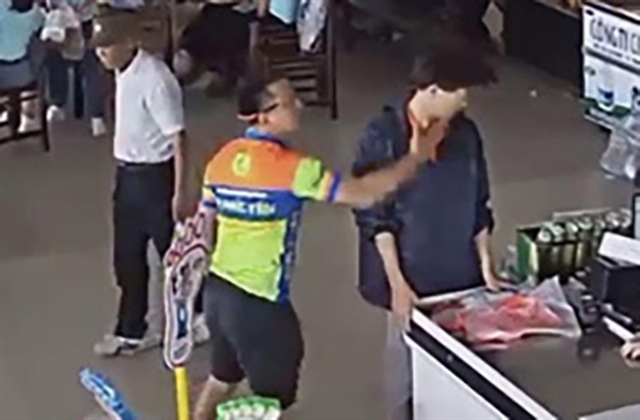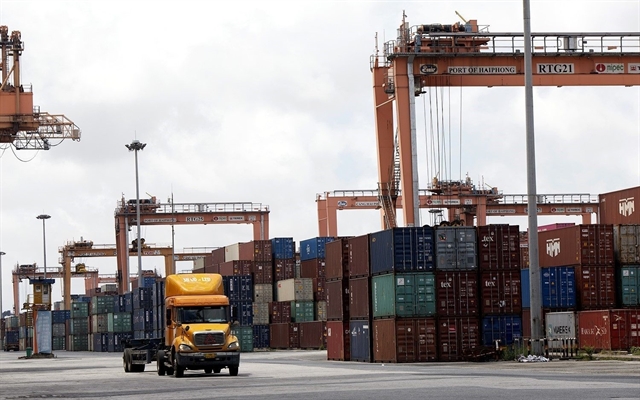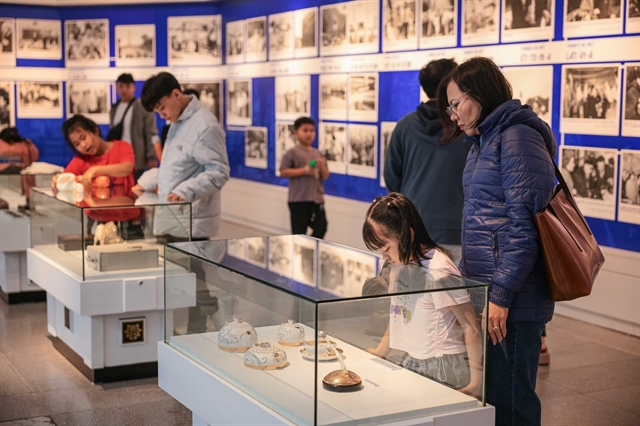 Op-Ed
Op-Ed


|
| Senior Lieutenant Nguyễn Xô Việt, a police officer in Thái Nguyên Province, is seen slapping a staff member at the Hải Đăng Rest Stop on CCTV. |
By Hồng Minh
A police officer in the northern province of Thái Nguyên was caught on CCTV assaulting a member of staff at a rest stop in Phổ Yên Town on Sunday.
The CCTV footage has gone viral on social media since then, with Senior Lieutenant Nguyễn Xô Việt, in plain clothes, seen throwing a sausage at a cashier at Hải Đăng Rest Stop and then slapping a male member of staff.
The official explanation for the incident is that Việt got angry after staff asked his son to pay for the sausages he had taken from the store.
Việt has since been suspended from work for a month pending an investigation into the incident. But the video is still online, and people are getting angry about the bad attitude of police officers who think they are above the law. The case has reminded everyone about another incident that happened just three months ago.
On August 11, a female police officer in Hà Nội’s Đống Đa District, Captain Lê Thị Hiền, flew home from HCM City. After checking in her luggage quota, she wanted to send an additional eight kilos. However, the airport staff refused and suggested Hiền take it as hand luggage. The officer erupted, cursing at staff and pushing security guards who tried to contain her. The verbal and physical abuse was recorded by passers-by and posted online, causing widespread outrage. She might face demotion and a transfer pending an internal investigation.
More than anyone else, Hiền and Việt, as public security officers, must have undergone the strict recruitment and training process to become part of the People’s Police force. That includes learning by heart and following President Hồ Chí Minh’s Six Teachings, Five Oaths and 10 Disciplines of being a police officer.
I believe one of the first things they did at police academy was probably solemnly swearing an oath to respect and be polite to the people. They are instructed to always be ready to protect lives, property, rights and the legitimate interests of the people, and serve them for a safe, peaceful and happy life.
I know that one of the 10 disciplines of the People's Police force involves the spirit of unconditional service to the people, and having a warm, polite and proper attitude when interacting with them. They are all taught to respect the elderly and women, love children, and help people with disadvantages. They should not be bossy, authoritarian or cause problems for the people.
And above all, they must understand the law and why it’s in place. They must set an example by showing that acts such as insulting others, not to mention assault, are clear violations of the law.
Sadly, the actions of both officers were completely contrary to the teachings of President Hồ and the oaths they had solemnly declared. In both cases, they turned into arrogant and despised people. Their actions not only violated the morals of the People's Police force, they also violated the law.
Yes, it is sad to see those who supposedly be enforcing the law are among those violating it.
Moreover, they blatantly committed these acts in public places, in front of hundreds of people. Do they give themselves the right to stand above others, or do they think when they take off their uniforms they are no longer obliged to do their duty?
Unfortunately, the cases of Hiền and Việt are not uncommon. “One scabby sheep is enough to spoil the whole flock,” to coin a pharse.
Of course there are stories of police officers who really understand and seriously follow the teachings and the oaths they took to serve and respect the people unreservedly.
There have been instances of police officers sacrificing themselves to save people from floods and fires. Others have faced life-or-death situations to catch thieves, robbers and drug dealers to ensure safety and security for the people. Last week, a Government report released at the ongoing National Assembly meeting showed that from 2016, 45 police officers had died on duty, more than 365 were exposed to HIV, and 1,314 had been injured. Many officers have also been left disabled, and will carry the cost of the dedication for the rest of their lives. Another report showed that from 2014, five firefighters had died while dozens more had been injured in the line of duty.
That reminds me about Thao Văn Súa, a village police chief in the central province of Thanh Hóa’s mountainous district of Mường Lát, and Phạm Minh Tú, a police officer in the Tây Nguyên (Central Highlands) province of Lâm Đồng’s Bảo Lộc City, who both died on duty trying to save people from flash floods in August. That also reminds me of a photo of a firefighter with a scorched face having bravely run into a fire to rescue a boy in Hà Nội last month.
Senior Lieutenant Colonel Lê Đức Đoàn also springs to mind. He regulated traffic on Hà Nội’s Chương Dương Bridge for 20 years out of his 40 years in the service. During that time, Đoàn was praised for being friendly and helpful to all who passed by, always reminded people about minor violations of traffic regulations. During his time there, he also persuaded some 40 people who planned to commit suicide on the bridge not to do it. He was so loved and respected by people who used the bridge each day that when he retired five years ago, there was an outpouring on social networks from completely strangers who just passed by every day and received a friendly wave from him.
Yes. Such images are what the people expect of police. They should be willing to protect and respect the people. They should not show aggression or violence towards the people.
Obviously, the violent behaviour of one or two individuals, like Hiền and Việt, does not represent the whole police force. But obviously, again, these cases affect the image of the police in the public eye, for which so amount of sacrifice, or even blood, can ever repair.
These are special cases, but perhaps it is time for the police force to look frankly at shortcomings in recruitment and training, and strictly handle such violators. They should live up to the high expectations the people have for them. — VNS




